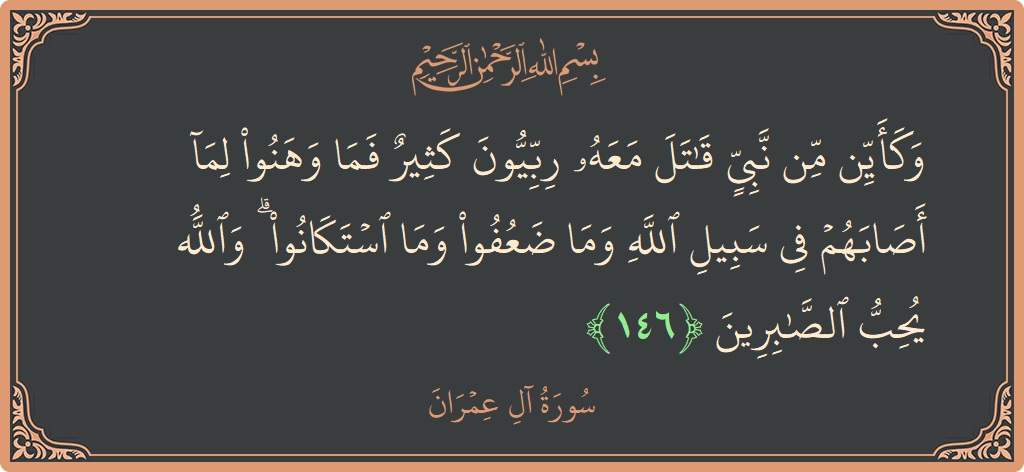Surah Aal-i-Imraan: Verse 146 - وكأين من نبي قاتل معه... - English
Tafsir of Verse 146, Surah Aal-i-Imraan
English Translation
And how many a prophet [fought and] with him fought many religious scholars. But they never lost assurance due to what afflicted them in the cause of Allah, nor did they weaken or submit. And Allah loves the steadfast.English Transliteration
Wakaayyin min nabiyyin qatala maAAahu ribbiyyoona katheerun fama wahanoo lima asabahum fee sabeeli Allahi wama daAAufoo wama istakanoo waAllahu yuhibbu alssabireenaTafsir of Verse 146
Connected with previous verses where Muslims were admonished for some of their shortcomings during the battle of Uhud, the present verses cite examples set by men of Allah from earlier communities showing how steadfast they were on the battlefield, something which should be emulated by the present addressees.
The explanation of some words:
1. رِبِّيُّونَ Ribbiyun): a derivation from Rabb (رَبّ ) like Rabbani (رَبّانی) meaning 'of the رَبّ Rabb or Lord' which has been rendered as men of Allah in the present translation. According to Ruh al-Ma‘ani, here the use of the vowel sound 'i' in place of 'a' is irregular. Some commentators take رِبِّيُّونَ 'Ribbiyun': to mean 'many groups'. In their view, this is derived from the word, 'Ribbah' (رَبّہ) which means 'the group'. Now, as to who is meant here by رِبِّيُّونَ 'Ribbiyun': (men of Allah), it has been reported from Sayyidna ` Abdullah ibn ` Abbas ؓ and Iiasan al-Basri that this refers to ` ulama' (religious scholars) and 'fuqaha' (juriconsults). (Ruh a1-Ma` ani).
2. 'Istakanu' (اسْتَكَانُوا) has been derived from 'istakanah' (اسْتَكَانُہ) and means 'to be subdued and rendered weak and immobile' (Baydawi).
3. 'Wahanu' (وَهَنُوا) has been derived from 'wahn' (' وَهنُ ) and means 'to lose heart under suffering' or 'wilt under pressure.'
Commentary
After citing the example of men of Allah fighting along with previous prophets who remained undeterred and un-weakened against, heavy odds, the Holy Qur'an mentions another great quality of the men of Allah who, inspite of their own sacrificing conduct, kept praying to Allah Almighty to:
1. Forgive their past sins,
2. Condone any shortcomings that may have crept in during their present Jihad efforts,
3. Enable them to remain steadfast and
4. Make them prevail over enemies.
These prayers carry some important guidelines for Muslims by implication.
Never be proud of a good deed
A true Muslim who knows things as they are is not supposed to wax proud of what he accomplishes by way of a good deed. No matter how great the accomplishment or how exacting the struggle in the way of Allah, he just does not have the, right to pat himself on his back, for his very accomplishment of a good deed, in all reality, is the direct outcome of nothing but the grace and mercy of Allah Almighty. In fact, no good deed can even issue forth without it. It appears in a hadith:
فو اللہ لو لا اللہ ما اھتدینا
و لا تصدقنا ولا صلینا
Had it not been for the grace and mercy of Allah, we would have not received guidance in the straight path, nor we would have been able to pay zakah and perform salah.
Seek Forgiveness from Allah under all conditions:
As for a good deed one gets the ability to perform, the truth lies in realizing that it is not within one's control to perform that deed exactly in accordance with the demands of the supreme magnificence of the One who holds the reins of the Creation and Command in His hands. No matter how hard one tries to do things correctly but falling short is inevitable, especially when it comes to doing things as is the due and right of Allah. Therefore, the seeking of forgiveness is also necessary during the very course of such a deed.
Pray for steadfastness and consistency in good deeds:
It is not possible to predict the continuity of a good deed. Who can say for sure that he will be given the ability to go on doing his good deed in the future also just as he is doing it now? All this is a matter of what is known as Taufiq, the God-given ability to perform what is good. Therefore, we should repent over any shortcomings in what we are doing in the present and pray that Allah makes us steadfast and persistent in the future. For a true Muslim, this prayer should become his second nature.
It should be noted that the prayer for the forgiveness of past sins, appearing first, is a subtle hint to the fact that pain caused or defeat suffered in this mortal life is, more than often, a reflection of one's past sins which can be cured through repentance and seeking of forgiveness.
The last verse promises a good reward for the men of Allah in this world as well as in the other. It means that, right here in this mortal world, Allah Almighty gives them ultimate supremacy over the enemies and grants them success in their mission. Then comes the reward in the Hereafter. That reward is certainly the real one, an ideal state of peace and happiness which will never fade out. This factor has been pointed out by the addition of the word حُسن : (husn: beauty) before 'return in the Hereafter' which makes it read:
وَحُسْنَ ثَوَابِ الْآخِرَةِ ۗ
And the better reward in the Hereafter. (148)
